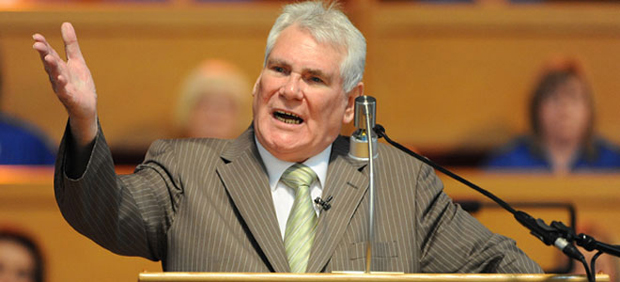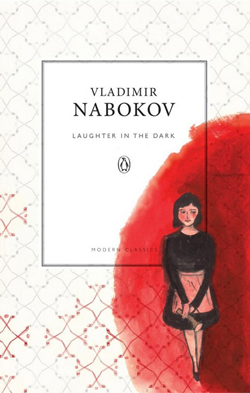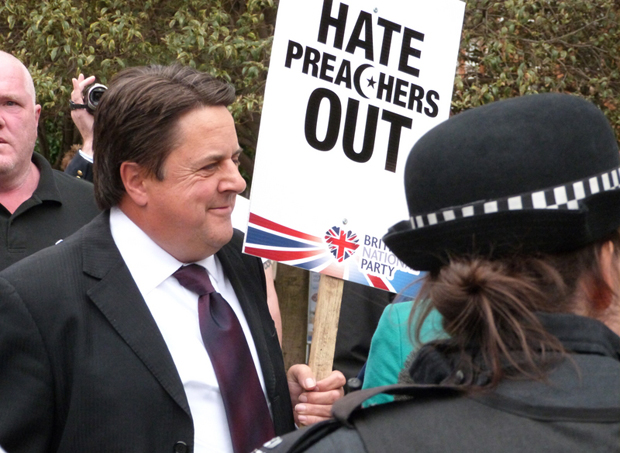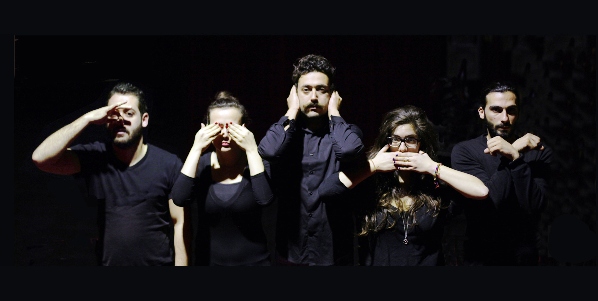29 May 2014 | News and features, Religion and Culture, United Kingdom

Pastor James McConnell
Belfast’s Whitewell Metropolitan Tabernacle is one of those things that makes a soft Southern Irish atheist Catholic like me think I’ll never truly understand Northern Ireland.
Every week, Ulster Christians flock from across the province to the 3,000-seater auditorium, there to hear Pastor James McConnell preach his Christian message. Not the Christian message of the BBC’s Thought For The Day, however; you may hear Beatitudes at Whitewell, but it’s not a place for platitudes. This is the real deal, fire and brimstone; damnation and salvation. If you’re not going to Whitewell, you’re going to Hell.
It is a comforting message, and actually, a very modern one. Think of how many politicians these days talk about how they work for hard-working-families-that-play-by-the-rules. Hardline evangelical Christianity is the epitome of that idea. We don’t refer to the “Protestant Work Ethic” for nothing.
But what we tend to forget when discussing hardliners from the outside is that there is a strong apocalyptic element in orthodox monotheistic religion. This is particularly true of Christianity. The closer to the core you get, the more you find Jesus’s teachings are essentially about the end of the world, not some vague being-nice-to-one-another schtick.
For some time, Christians have fretted over Matthew 24, in which Jesus apparently tells of the signs of his second coming, that is, to, say, the end of the world. What worries them particularly is Matthew 24:34: “Verily I say unto you, This generation shall not pass, till all these things be fulfilled.”
Does this mean Jesus was telling his apostles that the world would end in their lifetime? CS Lewis, in his work The World’s Last Night, seemed to believe so, and went so far as to call the Messiah’s assertion “embarrassing”. Lewis wrote:
“‘Say what you like,’ we shall be told, ‘the apocalyptic beliefs of the first Christians have been proved to be false. It is clear from the New Testament that they all expected the Second Coming in their own lifetime. And, worse still, they had a reason, and one which you will find very embarrassing. Their Master had told them so. He shared, and indeed created, their delusion. He said in so many words, ‘This generation shall not pass till all these things be done.’ And he was wrong. He clearly knew no more about the end of the world than anyone else.”
“It is certainly the most embarrassing verse in the Bible. Yet how teasing, also, that within fourteen words of it should come the statement ‘But of that day and that hour knoweth no man, no, not the angels which are in heaven, neither the Son, but the Father.’ The one exhibition of error and the one confession of ignorance grow side by side.”
Lewis, though himself a Northern Irish Protestant, was clearly not of the same cloth as Pastor McConnnell, Ian Paisley, and the other preachers of their ilk. Orwell disdained Lewis for his efforts to “persuade the suspicious reader, or listener, that one can be a Christian and a ‘jolly good chap’ at the same time.” The booming pastors of Northern Ireland, and other Christian strongholds such as the US’s Bible Belt, are very firmly convinced that the end is imminent. And thus, they do not have time to be “jolly nice chaps”. There are souls to be saved, right now.
It’s this attitude that has got Pastor McConnell into trouble in the past week. Recently, at Whitewell, inspired by the story of Meriam Yehya Ibrahim, a Sudanese woman reportedly sentenced to death for converting to Christianity, McConnell told the thousands assembled at his temple that “”Islam is heathen, Islam is Satanic, Islam is a doctrine spawned in Hell.”
In an interview with the BBC’s Stephen Nolan, McConnell refused to back down, claiming that all Muslims had a duty to impose Sharia law on the world, and suggesting they were all merely waiting for a signal to go to Holy War. A subtle examination of modern Islamist and jihadist politics this was not.
The PSNI is now investigating McConnell for hate speech. Northern Ireland’s politcians have been quick to comment. First Minister Peter Robinson backed McConnell, first saying that the preacher did not have an ounce of hate in his body, and then managing to make the situation worse by saying he would not trust Muslims on spiritual issues, but would trust a Muslim to “go down the shops for him”.
Insensitive and patronising that may be, but Robinson also touched on something more relevant to this publication when he said that Christian preachers had a responsibility to speak out on “false doctrines”.
The issue raised is this: if we genuinely believe something to be untrue, no matter how misguided we may be, do we not have a right to challenge it in robust terms? In politics we often bemoan the fact that leaders will not call things as they, or we, see them: indeed, Tony Blair, the bete noire of pretty much every political faction in Britain (a bete noire who oddly managed to win three election) has found grudging praise from across the spectrum this week for suggesting that rather than “listening to” or “understanding” the xenophobic United Kingdom Independence Party, politicians should tackle their arguments head on.
But in religion, we tend to hope that no one will upset anyone too much, in spite of the fact that, for true believers, theological issues are far more important than taxation or anything else.
When Blair’s government proposed (and eventually passed) a law against incitement to religious hatred in Britain, the opposition came from a coalition of secularists and some evangelical Christians, both groups realising, for different reasons, that being able to call an ideology false or untrue – and in the process criticise and question its adherents – was a fundamental right. The trade off in that is acknowledging others’ right to question your truths, something I suspect, judging by the recent controversy in Northern Ireland over a satirical revue based on the Bible, Pastor McConnell and his supporters may not quite excel at.
This article was originally posted on May 29, 2014 at indexoncensorship.org
22 May 2014 | Academic Freedom, News and features, Religion and Culture, United Kingdom

“Once upon a time there lived in Berlin, Germany, a man called Albinus. He was rich, respectable, happy; one day he abandoned his wife for the sake of a youthful mistress; he loved; was not loved; and his life ended in disaster.”
So begins Vladimir Nabokov’s Laughter In The Dark, a terse, tragic little book. There’s really not much more I can tell you about it, apart from the fact that the “youthful” mistress is uncomfortably so, Albinus says and thinks some quite sexist things about women, and he ends up disabled (and worse).
Perhaps then, in light of recent requests from English Lit students on American campuses that teachers should provide “trigger warnings” for novels that could contain traumatising themes and scenes, this already revealing opening could be rewritten:
“Once upon a time there lived in Berlin, Germany, a man called Albinus. He was rich, respectable, happy; one day he abandoned his wife for the sake of a youthful mistress; he loved; was not loved; and his life ended in disaster. TRIGGER WARNING: sexism, cis-sexism, borderline paedophilia, violence, ableism.”
Would that be so bad? Clumsy, no doubt, but does it really affect the reader’s experience, or, specifically, the academic learner’s ability to analyse the book? Well, yes, in that it skews one’s expectations, forces one immediately to think “this is a book about misogyny, violence, and disability,” rather than a book about say, the upheaval of interwar Europe, the clash of old and new, or just good old hubris: things Laughter In The Dark are actually about, rather than things that happen in Laughter in the Dark.
The trigger warning has its origins in online forums dedicated to specific topics, and in the backlash against the idea that has happened this week, some commentators have pointed out that this is an imposition by one small community on general society: Jonah Goldberg in the LA Times, for example, unfavourably compared those calling for trigger warnings on campus to Amish people, pointing out that the Amish would prefer not to have to deal with a lot of the modern world, but at least they don’t inflict their desires on other people.
It’s a tempting “who do these people think they are” argument, made all the more so enticing by the intergenerational aspect – pretty much every person I know over the age of 30 finds the “social justice” movement, from which ideas such as trigger warning have sprung from, equal parts infuriating and baffling. It feels like a world of endless taboos and astonishing sincerity, far removed from the heavy irony that, for better or worse, characterised the generation that preceded it.
And they don’t like us much either: writing for Vice last week, Theis Duelund denounced Generation Xers, born between 1965 and 1980, as “slackers [who] nihilistically accept the machine of which they are a part, and can dissect its fundamental facile and evil nature with all the clarity and urgency of a nineteenth-century Romantic poet.”
(If Theis wants to play that game, I’m creeped out by a generation of people for whom dressing up as something out of My Little Pony seems an acceptable subculture for an adult to be involved in).
But changes rarely come from spontaneous mass movements; more often than not, they come from persistent nagging from a minority (or “campaigning” as it’s more kindly called), who eventually convince the rest of us. So to complain that things such as trigger warnings are being foisted upon us by a small group of millennial social justice activists is to avoid the argument about generalised trigger warnings for literature themselves.
The argument being this. Art is an expression of the human condition; our urge to create art, and to consume art, is in large part driven by our need, as social animals, to communicate, to empathise and sympathise.
What that does not mean, however, is that a work of art should, or will, provoke a specific response. Alain De Botton, the writer of philosophically styled self-help books, has recently suggested, through an exhibition he has curated at the Rijksmuseum, that we can use art for self-improvement, implying that specific works inspire specific emotions. It’s a silly, reductive, anti-human argument, implying that there is a correct way to view art, and a correct single message to be taken from it.
Much of the discussion around trigger warnings, and indeed broader discussion of the modern “social justice” movement, is similarly anti-nuance. In the eyes of the online social justice activist, questioning is tantamount to discrimination. This, I believe, is partly generational – asking someone to explain something seems strange to generation just-fucking-Google-it, but as I’ve said, we shouldn’t make age the issue here.
The worry is that in an effort to protect individuals, we risk destroying empathy. The social justice term “allies” has replaced the old fashioned idea of “comrades”. You can support people’s struggle from a distance, “ally” suggests, but you cannot stand with them, because you do not understand the entirety of their experience. It implies a lack of faith in human imagination, in our ability to think outside of ourselves, and in the complexity of the human condition.
So it goes with the trigger warning: there seems little belief here in the idea that a work of fiction could tell us something bigger about the world, could help us understand our fellow beings; or even that reading about experiences that mirror your own may actually help, may make you realise that you are part of something universal. Blood-and-guts fantasy fiction such as Game of Thrones seems to escape opprobrium, perhaps exactly because it’s not seen as being anything to do with the bad things that happen in the real world.
The message and tone of the “trigger warning” suggests a sad lack of faith in the power of art, and, by extension, humanity. We’re capable of better.
This article was posted on May 22, 2014 at indexoncensorship.org
15 May 2014 | News and features, Politics and Society, United Kingdom

Nick Griffin, leader of the British National Party, arrives at a protest in June 2013 in Westminster. (Photo: Paul Smyth / Demotix)
BBC Radio Five Live’s Breakfast yesterday dutifully carried out its public service remit by interviewing Nick Griffin, the world’s most tedious Nazi demagogue, ahead of the European elections. Griffin’s British National Party does have some seats in the European Parliament, so is entitled to some airtime.
It was a dull interview. They always are. The BBC interviewers–in this case, Nicky Campbell–want to pick away at the BNP facade, but always somehow miss out on the really strange stuff. Long ago, I vowed that I would never write about Griffin without pointing out that he had written a pamphlet called “Who Are The Mindbenders?”, which is a catalogue of Jewish and Jewish people who work in the media. Griffin believes that these evil Jews (sorry, “Zionists”) are involved in an enormous plot to keep him–the saviour of the white race–out of the press and off the airwaves.
The conspiracist aspect of BNP policies is often overlooked, with the straightforward racism critiqued more heavily. So it was here. Campbell asked Griffin if he had a problem with black and mixed-race players representing England in the upcoming World Cup. Griffin, barely missing a beat, started complaining about BBC liberals smearing him and worse, denying him airtime.
“The BBC owes me 12 Question Times,” he declared, bemoaning his lack of invitations to appear on the BBC’s Thursday night festival of shouting from and at the telly.
It might have been interesting to delve into why Griffin felt he was being kept off Question Time, to see how long he would be able to maintain a line before going full Doctor Strangelove. As it was, we got only the superficial whine. The whine of the martyr-bully.
It is the background sound of our time. There is absolutely no one engaged in modern public life at any level at all who has not complained that they’ve been silenced, denied a platform, bullied into submission by a cruel cabal of agents of reaction or “the liberal agenda”, take your pick.
That is not to say people are not censored, even in the lovely modern 21st Century. It happens, quite a bit. People get locked up for saying stupid things on the internet that affront public sentiment. For years the libel laws restrained reporters, reviewers and the man on the Clapham Omnibus from saying what they really knew, or thought, or thought they knew. And no reader of this site needs to be told what happens in the less than democratic countries all over the world.
But there is actual censorship, and there is the claim to being censored, which are often two separate things. The BNP’s Griffin, UKIP’s Nigel Farage, and every Blimp all the way to Westminster delights in telling us, at length, the things that nobody, least of all them, is allowed to talk about anymore.
Meanwhile, on the left and the pseudo-left, there is an obsession with “platforms”; who has one, who deserves one, who is denied one. Editors and writers who do their best to represent as many diverse views as possible are denounced routinely for the articles they haven’t published rather than the ones they have. Every oversight is evidence of a conspiracy rather than a cock-up. The right people are always being excluded by the wrong people. If only, if only everyone shut up and let me speak, we think, then I could sort everything out.
It’s ironic that many of those who argue most vehemently that they are being censored are the exact ones who demand everyone else shut up. Intersectional feminists who insist they are being excluded from debate demand that radical feminists be “no platformed”. Ukipers who claim they’re not allowed talk about immigration want the police to arrest their opponents in anti-racist movements. All of them, simultaneously, noisily, will end up invoking Niermoller’s “First they came for…” (with the possible exception of the BNP, who, stopping short of displaying sympathy with Communists or Jews, instead content themselves with calling their opponents “the real fascists”, as I once heard Griffin do at Oxford Union).
Why is this? Why does everyone want to be censored?
It’s possible that the simple reason is that we are constantly improving as a society. Triumphalism and privilege are pretty much taboo for many. On the face of it, most of the people reading this, and certainly the person writing it, are probably the luckiest sons of bitches to ever have walked the earth. But a combination of our still-relevant horror at the great wars of the last century, plus a greater ability to learn about the ideas and experiences of others, make most of us wary of revelling in our role as the victor. Instead, we prefer to be the underdog, because underdogs are more virtuous–victims rather than perpetrators. Martyrs, even.
The Nazis and Communists of the 20th century also believed they were more sinned against than sinning, but the difference was that they were certain they would show the world who was really boss. Now, no one outside the most extreme movements – Al Qaeda; or North Korean Juche – really wants to state that aim openly. We want to remain oppressed. Censorship is considered almost universally as a bad thing, so people on whom it is inflicted are good.
The background whine of censorship, emanating even from the powerful may just be the tiny price we pay for a world that is generally better and kinder.
I think we can live with that.
This article was posted on May 15, 2014 at indexoncensorship.org
13 Sep 2013 | Lebanon, News and features, Religion and Culture

A publicity shot from Lucien Bourjeily’s latest play, Would It Pass Or Not?
Lucien Bourjeily retains a sense of humour. It’s an important attribute for a playwright taking on Lebanon’s censors.
Earlier this year, Bourjeily, an internationally acclaimed writer and director who dazzled the London International Festival of Theatre 2012 with his immersive work 66 Minutes In Damascus, wrote a play about Lebanese censorship. “Would It Pass Or Not?”, produced by anti-censorship group March, addresses the question every Lebanese writer and artists asks themselves before sitting down to begin a work.
Lebanon is a country battling to keep a lid on sectarian tensions, and eternally caught up in other people’s wars. Censorship is seen as a national security issue, and overseen by the army.
Like so many modern blue-pencillers, the Lebanese Censorship Bureau insist that it is only protecting citizens. There is, says Bourjeily, quite a bit of sympathy for this argument in the country.
So Bourjeily decided to tackle the topic head on and write not about the many sensitive issues in Lebanon but about the censors themselves.
Suspecting that the answer to “Would it pass or not?” would be an emphatic “not”, he and his company sought to exploit a loophole, performing their play on university campuses to invited audiences rather than in public theatres. The censors still pursued him. Two officers from the bureau turned up at a university show and broke up the performance. Bourjeily decided he would try to test the censor’s decision.
In conversation with Index, Bourjeily told of his bizarre encounters with the censor board’s general. He was summoned to the bureau in Beirut on 28 August.
The play cannot go ahead, he was told, because it was not realistic. It was exaggerated.
True, Bourjeily says. It’s fiction. Of course it’s unrealistic and exaggerated. Otherwise it would be a documentary.
The general turns to his subaltern and describes scenes from the play, asking “would such a thing happen here?”, unintentionally and ironically echoing a scene in the play itself. When censors are censoring a play about censorship, things are bound to turn to farce sooner or later.
Normally, Lebanon’s censors will suggest changes to works that will allow them to pass – a joke removed here, a political remark erased there. But with Bourjeily’s play, this was apparently not going to happen.
The censors’ next move was interesting: they would show, they said, that Boujeily’s play had no artistic merit. On 3 September, General Mounir Akiki appeared on television bearing testimony from four “critics”, each of whom said the same thing; that there was no artistic value in “Would it pass or not?”. Curiously, none of these critics were named, but their views were taken very seriously indeed. One said that Bourjeily’s play were “with a defamatory hallucination indicating the absence of his artistic level”, another that the play “was not related to the theatre, but rather with prosaic words and it does not meet the conditions regarding the structure.”
It’s a familiar ruse; if it’s not art, it’s not artistic censorship; if it’s rubbish, who would want to see it anyway?
In this, the censors echoed the notorious, and in hindsight ridiculous, court hearings over Lady Chatterley’s Lover in Britain in 1960 , the crux of the argument being whether the book was actually literature or mere obscene pornography. Great lengths were gone to by intellectuals such as Richard Hoggart to prove that Lady Chatterley’s Lover was literature, and thus, perhaps something one might wish your wife or your servants to read, at least if you were an enlightened sort of chap.
This is always what censorship of works of art comes down to: someone, be it the colonels, the Lord Chamberlain or whoever else, is to decide what you can read, what you can write, what ideas you can process. As the late Christopher Hitchens observed in a speech at the University of Toronto in 2006, if given the choice, would you nominate someone for that role? Or would you think you’d take your chances with your own intellect?
Lebanese writers and theatregoers are deprived of that option every day.
This article was originally published on 13 Sept 2013 at indexoncensorship.org




